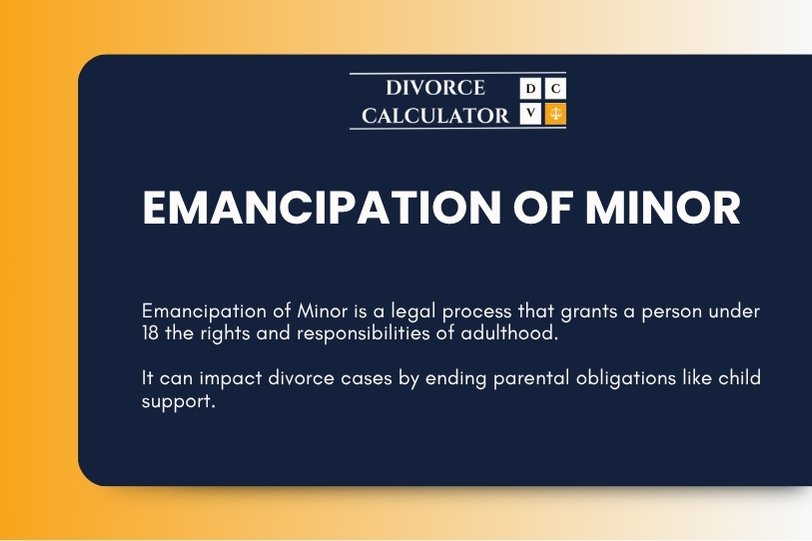When we talk about the emancipation of a minor, we refer to a legal process that grants someone under 18 the rights and responsibilities of adulthood before reaching the standard age. Emancipation allows minors to make important decisions independently, such as managing finances, choosing where to live, or consenting to medical treatment. This process is not automatic or easy and usually requires a court order based on specific criteria.
Understanding why and how a minor might seek emancipation is important for parents, guardians, and teens alike. We often encounter questions about eligibility, legal steps, and the real-world impact of emancipation on a young person’s life. Knowing the basics can help us navigate this complex subject confidently and responsibly.
Key Takeaways
Emancipation of minors is a legal process that grants a person under 18 some or all of the rights and responsibilities of adulthood. We should be aware that the requirements and procedures for emancipation vary by state.
Common reasons for seeking emancipation include:
- Unstable or unsafe home environments
- The need for financial independence
- Marriage or military service
Most courts require that the minor be at least 16, although some states allow younger applicants. We must provide evidence of the minor’s ability to live independently and manage personal finances.
Key consequences of emancipation:
- The minor will no longer have the legal right to parental support.
- Access to certain government benefits may change.
- Emancipated minors can enter contracts, sue or be sued, and make medical decisions.
It’s critical that we understand the legal process includes filing formal documents, possibly attending a hearing, and meeting strict criteria.
Table: Basic Criteria for Emancipation
| Criterion | Typical Requirement |
|---|---|
| Minimum Age | 16-17 |
| Proof of Independence | Required |
| Parental Consent | Often required |
| Court Approval | Essential |
We should consult legal counsel to ensure we follow the correct procedures and understand the full implications of emancipation.

Why It Matters In Divorce
Emancipation of a minor directly affects our divorce proceedings, especially in areas like child support and custody. Once a child is emancipated, the legal obligation to pay child support often ends.
Impact on Divorce Settlements
- We may need to adjust child support agreements if emancipation occurs.
- Division of responsibilities and parenting plans can also change.
For parents, emancipation means we might have fewer joint decisions about our child’s healthcare, education, or living arrangements. The minor gains legal independence, limiting our influence on their choices.
| Legal Aspect | Before Emancipation | After Emancipation |
|---|---|---|
| Child Support | Typically required | Usually ends |
| Custody | Court can decide | No longer applicable |
| Parental Decisions | Must be shared or assigned | Not required |
Emancipation can simplify the divorce process by reducing the number of legal issues we have to resolve. However, it also means changes to financial planning and family structure that we should consider.
If we expect our child to seek emancipation, it is important to discuss this with our attorneys to ensure that all agreements accurately reflect the new legal reality.
Real-Life Examples
We encounter the emancipation of minors in various scenarios, each illustrating distinct reasons and outcomes for seeking legal independence.
Example 1:
In California, a 17-year-old seeking to enlist in military service without parental consent applied for emancipation. The court granted the request, allowing the teen to sign legal documents and make independent decisions.
Example 2:
A 16-year-old in Texas, facing unsafe home conditions, petitioned for emancipation. With the help of a legal aid organization, the minor was able to live apart from family and secure employment and housing.
Here is a simple comparison of two common situations:
| Situation | Action Required | Result |
|---|---|---|
| Marriage under 18 | Court approval needed | Full emancipation |
| Financial self-support | Proof of income | Partial or full emancipation |
We have also seen cases where young artists and athletes seek emancipation for contract purposes. In New York, a 15-year-old actor was emancipated so they could sign professional agreements without a guardian’s approval.
These instances show that minors pursue emancipation for varied reasons, including safety, financial independence, or career needs. Each case requires meeting specific legal criteria and court approval before emancipation is granted.
How States Handle Emancipation Of Minor
Emancipation laws vary widely depending on the state, with some offering clear statutes and processes while others are more limited. Age eligibility, court procedures, and rights gained after emancipation differ in each state, requiring us to be aware of specific local requirements.
New York
In New York, there is no formal court process for minors to petition for emancipation. Instead, emancipation is typically recognized through certain situations and actions by the minor.
A minor must usually be at least 16 years old, living apart from parents, and be financially independent. Courts in the state may consider a minor emancipated if they meet these criteria and are not receiving support from their parents. There isn’t a standard form or petition process; instead, emancipation status is determined when an issue comes before a court, such as child support termination or access to services.
For example, a minor wanting official emancipated status for school or housing must prove their independence during relevant legal proceedings. The state does not issue emancipation orders or certificates. Instead, evidence of self-sufficiency and independence is reviewed on a case-by-case basis.
California
California offers a formal court process for minors aged 14 and over to seek emancipation. We can file a petition with the local superior court, and requirements are clearly listed in state statutes.
Minors must demonstrate:
- They are at least 14 years old.
- They willingly live apart from their parents or guardians.
- They can manage their own finances and source of income.
- The emancipation is in their best interests.
The court may require parental notice unless there are safety concerns. Once emancipated, minors gain rights such as signing contracts, consenting to some medical care, and enrolling in school. However, they still face some age-based restrictions, such as on voting or consuming alcohol.
For reference, the legal statutes governing this process include California Family Code §7000–§7002.
Texas
Texas law does not refer to emancipation but instead provides for “removal of disabilities of minority.” This process is outlined in Texas Family Code, Chapter 31.
Minors must generally be 17 years old (or at least 16 if living apart from their parents and managing their own finances). We need to file a petition in the district court, and parental notification is required. The court will review if the minor is self-supporting and capable of managing their own affairs.
If the petition is granted, the minor receives adult legal capacity for most purposes. This includes the right to sign leases, enter contracts, and make medical decisions. However, age restrictions still apply to activities like voting and purchasing alcohol or tobacco.
Florida
Florida allows minors aged 16 or older to petition the circuit court for emancipation under Florida Statutes § 743.015.
To apply, we must:
- Submit a written, verified petition to the court with parental consent (unless excused by the court).
- Provide evidence supporting our request, such as proof of financial independence and maturity.
The court will schedule a hearing and review the minor’s circumstances, including education, employment, and ability to support themselves. Emancipation, if granted, allows the minor to make legal decisions, such as signing contracts and enrolling in school independently.
However, emancipated minors in Florida remain subject to certain age-based laws, such as the minimum driving age or alcohol consumption rules. The process places a strong emphasis on ensuring the minor’s best interests and capacity for adult responsibilities.
Tips If You’re Dealing With Emancipation Of Minor
When we’re considering emancipation, it’s important to understand the local laws and requirements. Each state has its own process and necessary documentation. We should start by researching official resources or consulting a legal professional.
It’s helpful to gather all required documents early. This may include birth certificates, proof of income, and school records. Keeping these items organized can make the process smoother.
We may want to discuss the decision as a family or with a trusted adult. Open communication can help minimize confusion and ensure everyone understands the potential outcomes.
Key steps might include:
- Filing a petition with the court
- Attending any required hearings
- Providing evidence of financial independence
- Demonstrating the ability to manage personal affairs
We should be prepared for possible questions from the judge regarding our living situation, work, and plans for the future. Practicing honest, clear answers ahead of time can help.
Consider creating a checklist:
| Step | Status |
|---|---|
| Research local laws | [ ] |
| Gather documents | [ ] |
| Consult legal help | [ ] |
| File petition | [ ] |
| Attend hearings | [ ] |
If we’re unsure about any part of the process, seeking legal advice is recommended. This helps us avoid common mistakes and protects our interests.
Frequently Asked Questions
We address specific questions about the legal process, age requirements, and forms for minors seeking emancipation. Each answer provides practical details that apply within different jurisdictions.
What are the legal requirements for a minor to be emancipated without parental consent?
Legal requirements can vary by state, but usually a minor must demonstrate financial independence, stable housing, and maturity. Courts may consider whether staying with parents is unsafe or unsuitable.
Some jurisdictions also require that the minor is already living apart from their parents or guardians. Documentation and court approval are almost always necessary.
How to initiate the emancipation process in Louisiana?
In Louisiana, emancipation can be requested by filing a petition in the district court of the parish where the minor or parents reside. If the minor is 16 or older, they may begin the process themselves.
The court will schedule a hearing, and the judge will decide based on the minor’s best interests after reviewing the evidence.
At what age is a minor eligible for emancipation in various states?
Most states set the minimum age for emancipation between 16 and 18, with some allowing petitions as early as age 14. The precise age depends on the relevant state statutes.
We should verify eligibility requirements directly with the laws in the minor’s state of residence.
What are the typical responsibilities and rights of an emancipated minor?
An emancipated minor assumes most legal responsibilities of an adult, such as signing contracts, managing finances, and making medical decisions. They are responsible for their own support.
They may also lose certain protections afforded to minors, including parental financial support or the requirement to attend school, depending on the state law.
Are there different forms required for emancipation proceedings in different states?
Each state has its own required forms and procedures for emancipation. These may include petitions, affidavits, and notices of hearing.
We must consult the local court’s website or speak with legal professionals to ensure all paperwork meets local requirements.
What legal steps must a minor take to be emancipated in Pennsylvania?
In Pennsylvania, a minor must file a petition with the Court of Common Pleas in the county where they reside. They must include evidence of self-sufficiency and a statement of reasons for seeking emancipation.
A hearing is then set, and the judge evaluates whether emancipation serves the minor’s best interests before issuing a decision.



